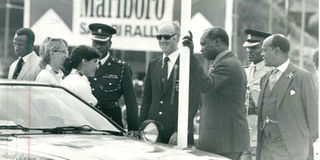Former President Moi was big supporter of the Safari Rally

Michele Mouton and Fabrizia Pons, drivers of car No.1, an Audi Quattro have a word with President Daniel arap Moi (second right) before setting the pace for the other competitors in the 31st Marlboro Safari Rally in 1983.
What you need to know:
- With Moi as Patron of the Safari Rally, government and private sector players were, naturally, eager to be associated with the competition.
Former President Daniel Toroitich arap Moi, who died on Tuesday, was an avid sportsman whose love for motorsport stood out.
He dutifully flagged off virtually every World Rally Championship Safari Rally as Vice President and then as President, turning the event into a State function, much to the admiration of the global rallying fraternity that never experienced such political goodwill elsewhere.
Moi’s first international official sporting function as President was on April 13, 1979, when he flagged off the Safari Rally outside the KICC. The rally was, fittingly, won by a Kenyan, Shekhar Mehta, navigated by Mike Doughty in a Datsun 160J. They went on to win the Safari three more times in a row with Moi always there to bid them bon voyage.
With Moi as Patron of the Safari Rally, government and private sector players were, naturally, eager to be associated with the competition. Top leadership was always by his side during the flagging off ceremony in front of global television cameras, followed by the prize-giving ball which would be graced by top government officials.
The Safari always gave Moi the much needed international media exposure, especially in the dark days of a crackdown on political dissidents and sanctions by donors.
The Safari received its first major international sponsorship from Philip Morris, under their Marlboro cigarette brand, which helped professionalise the event, although part of the reason for Philip Morris’ entry was to ride on the Safari’s brand visibility to sell its products in Africa.
Under Moi, drivers were granted many waivers, including importation of duty-free cars and spares to enable them to compete in the Safari. Behind the scenes, Moi also helped many young Africans operating on shoe-string budgets and appealed to the corporate sector to help them.
WRC Safari Rally Project CEO Phineas Kimathi says Moi was “a great man with a big, kind heart” who played a big role in shaping his rallying career during his formative stages.
The biggest beneficiary of Moi’s largesse was Patrick Njiru who freely mingled with the President. Njiru’s credits his success and public goodwill to Moi.
And one exceptional case was that of Moi’s eldest son, Jonathan Toroitich, who never received any preferential treatment from sponsors during his rallying career.
Following Moi’s appeal, sponsorship for African drivers increased in 1994. Njiru’s sponsorship from British American Tobacco (BAT) shot from Sh1.3 million to Sh8.5 million in 1995, then the highest endorsement for a sports personality in Africa. The company also gave the Safari Rally a Sh36 million annual sponsorship for three years.




